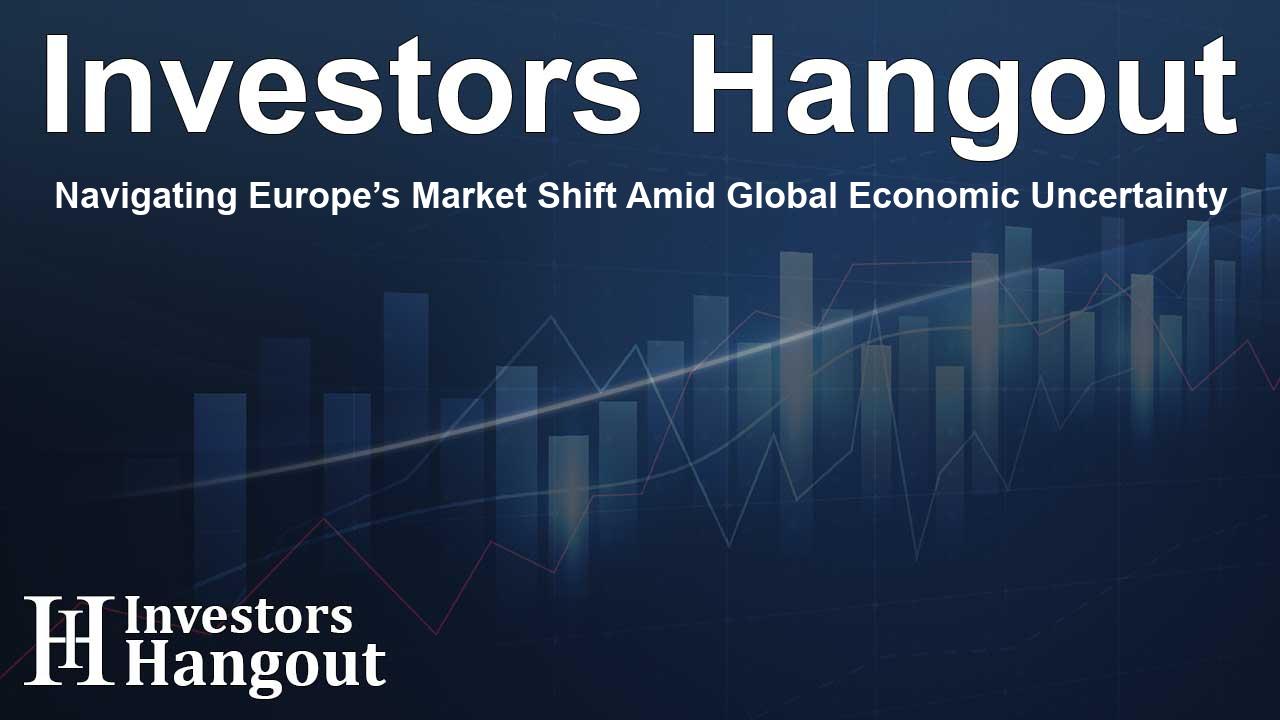Navigating Europe’s Market Shift Amid Global Economic Uncertainty

The Current State of European Stocks
In recent times, the European stock market has been grappling with significant challenges that threaten its momentum. Following a robust two-year period of gains, the driving forces behind this success have begun to wane, prompting concerns about the resilience of investor confidence. The market now finds itself in a precarious position, facing pressures from slowing economic growth alongside increasing tensions related to international trade, particularly with China.
Decline of Key Sectors
Prominent sectors that once led the charge for growth, like luxury goods represented by major players such as LVMH Moët Hennessy Louis Vuitton SE, have witnessed a notable downturn. Additionally, the automotive industry has struggled, and recent data raises alarms about the performance of the healthcare sector, with giants like Novo Nordisk A/S and ASML Holding NV sliding from their peak values. This retreat has left Europe’s equity performance exposed, raising questions about where the next wave of growth will originate.
Shifts in Investor Behavior
This year, the trend has seen investors withdrawing billions from funds and ETFs focused on European markets, contrasting starkly with a surge in capital flow towards U.S. markets and international equities. The main reason behind this is the falling pace of European stocks compared to their American counterparts, particularly the renowned Magnificent Seven tech companies driving considerable growth in the U.S.
Changing Leadership in the Market
Ariane Hayate, a seasoned fund manager at Edmond de Rothschild Asset Management, has noted that leadership within the European market is changing. Smaller, more defensive sectors are taking the lead, indicating a rotation in strategy by investors as they navigate the uncertain landscape. The reality is that Europe’s market is intrinsically more cyclical, heavily relying on sectors sensitive to economic fluctuations, making it vulnerable to external shocks.
Impacts of Global Trade & Economic Factors
European firms rely significantly on Chinese demand, with about 8% of their revenues tied to the region, starkly contrasted with just 2% for companies listed on the S&P 500. However, the risk of escalating trade wars, particularly with the prospect of new tariffs, looms large and may amplify existing pressures. In addition, the decline in oil prices is complicating matters for energy firms like BP Plc and Shell Plc, undermining their growth forecasts.
Market Resilience and Future Prospects
While prospects for growth sound daunting, there are pockets of potential that some analysts believe could thrive amid market turbulence. For instance, banks and utilities are gaining favor, with European banks enjoying a remarkable 18% rise in stock performance this year. Observers believe that as their dividends increase, so too will their stock valuations, bringing renewed investor interest and potential growth.
Investor Strategies Moving Forward
As markets transition, the focus will shift towards small and mid-cap stocks. Amelie Derambure, a multi-asset portfolio manager, emphasized the importance of observing growth momentum indicators that could signal a recovery in economic activity that benefits these often-overlooked segments. Through careful investment in these areas, there is an optimistic view of broadening out the stock market rally in the event of an economic soft landing.
Frequently Asked Questions
What recent changes are affecting European stocks?
European stocks are facing challenges as key sectors decline, leading to investor withdrawals and a shift in market leadership toward smaller, defensive sectors.
How do U.S. tech companies influence European markets?
The performance of major U.S. tech companies has set a benchmark that European firms are struggling to meet, leading to decreased investor confidence in European equities.
What role does Chinese trade demand play in Europe?
China is a major market for European companies, with a significant portion of revenue derived from there; any trade disputes could severely impact earnings.
Which sectors are currently thriving in Europe?
Banks and utilities have shown resilience and are gaining attention from investors due to their potential for rising dividends and valuations.
What should investors focus on moving forward?
Investors are encouraged to monitor small and mid-cap stocks, which may benefit from an economic recovery, presenting new opportunities for growth.
About The Author
Contact Kelly Martin privately here. Or send an email with ATTN: Kelly Martin as the subject to contact@investorshangout.com.
About Investors Hangout
Investors Hangout is a leading online stock forum for financial discussion and learning, offering a wide range of free tools and resources. It draws in traders of all levels, who exchange market knowledge, investigate trading tactics, and keep an eye on industry developments in real time. Featuring financial articles, stock message boards, quotes, charts, company profiles, and live news updates. Through cooperative learning and a wealth of informational resources, it helps users from novices creating their first portfolios to experts honing their techniques. Join Investors Hangout today: https://investorshangout.com/
The content of this article is based on factual, publicly available information and does not represent legal, financial, or investment advice. Investors Hangout does not offer financial advice, and the author is not a licensed financial advisor. Consult a qualified advisor before making any financial or investment decisions based on this article. This article should not be considered advice to purchase, sell, or hold any securities or other investments. If any of the material provided here is inaccurate, please contact us for corrections.
